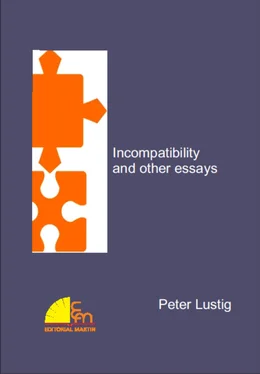There remains the question as to how well this “true”world, made up of what amounts effectively to “reality”, can be known and to what extent this actually matters, in view of the tendency to interpret and equivocate, rather than to disengage from subjectivity. How would anybody determine that regard for “truthfulness” can make a difference, if it is known that human nature will normally view any version of reality at a slant? Is it at all possible to consider this contradiction in a single breath? Can anybody make headway toward finding common ground for a compromise, or will convictions invariably take precedence over human lives, when “truths” are at stake? With what is a person left if he has been deprived of the right to exist because his convictions have come into question? Worse still, supposing he was alleged to hold these convictions because he had been assigned a collective identity, where does this leave him as an individual? Is victimization eased through sharing the fate of others, or is there a “moment of truth” when the only thing that counts is what happens to oneself?
The sufferer is always, inwardly, an individual. This is so to the extent that human nature is expected to look askance before a dire plight and “humaneness” under pressure is a virtue attributed to “education” (with or without the support of “reason”) How can“unselfishness”, or even “selflessness”, be explained while human nature is described as essentially self-centred? Does this not suggest there must be something “real”out there that belies “human nature”? If so, what are the chances that there may be no such “human nature”, but any number of possible choices regarding behaviour, with or without the benefit of “education”, and even before attaching a reason to these choices?
It is easy to formulate unlimited questions on an issue without coming forward with an answer. Yet, never for a moment can anyone deny that there is a warning note sounded every time interpretation is given the upper hand over attempting to show things as they really are. The danger lies in allowing oneself to be drawn away from a rational approach, though it were only for the sake of getting more attention. It would be useless to try to make heads or tails of something that was not devised for effective communication. So much for “irrationalism”!
The sum total of the arguments conducive to expose the disarray of opinions on an underlying reality, as an outcome of psychological diverseness, rules out any attempt to arrive at an objective assessment. Discussing psychology refers to the subject, not to the object. Despite the convenience, or the usefulness, of focusing on the reasons why some people do certain things, a study of behaviour can never explain away its external motivating agents, as if they only existed as an excuse for self-delusion and were not at all real themselves. The unavoidable conclusion suggests that psychology and ontology are separate fields that do not intersect and they must be dealt with accordingly.
Foremost lies the concern about demographic encroachment, so that the prospect of a “loss of identity” might afflict a polity as a consequence of having given way to multiculturalism. A case in point might be France, in danger of being taken over by a Muslim majority within the next so many years, as outlined in a big splash by one M. Picketty, an economist, with reference to a recent population survey.
It can only be remarked that countries geographically larger and emptier than France, that took in proportionally more culturally diverse people, were able to help immigrants adapt and become integrated within a couple of generations, even if this implied a measure of give and take that may have affected the outward appearance of society and modified to some extent its supporting cultural biases. Why would France be more vulnerable, being endowed with greater density of population, were it not for the inadequacies of its anti-discrimination legislation?
Aside from the consolidating experience of winning wars (as long as one’s own territory is never overrun), cultural identity does not come into consideration, at all. Involvement simply becomes a matter of taking sides and it has no bearing on who you are, how you look or what language you speak. It depends only on the way you think. A collective identity will have taken shape under unprecedented conditions, in the sense that life is, of necessity, unrehearsed and, therefore, unpredictable. Learning takes place in the course of events and this, in turn, becomes self-defining.
Whoever trains his sights on outlining a plan for the future -as in this case, to envisage a post-war scenario with tolerance for a shifting society- must be equipped with further insight, in order to exercise leadership where others are merely prepared to fall into step, as an alternative to millions being left entirely out of the picture, even to the extent that their survival were in the balance. Having made plain the difference between a leader and his following, there remains little to say about why some should succeed while others fail; but there can be no a priori certainty about outcomes, just as it would not make sense to attribute any initiative to the masses because they had responded to mobilization, in either political and/or military terms.
Some fixed notions as to why learning takes place can be traced to Antiquity. For instance, that knowledge is attained unrelated to practical interest, in response to “disinterested” curiosity. True as this may be, the only knowledge that counts is that which contributes to solve an existential problem. That people should at times take upon themselves the defense of a position detrimental to their fortunes, or their lives, in no way rules out that they may be doing so for a reason closer to their hearts, even if it means they would be bringing about their own downfall (as the Germans and the Japanese, in World War II). They partook of a gamble for the sake of something that meant the most to them, self-preservation, with an eye on what they held to be in their best interest.
Although not everybody can be expected to live up to such standards of “ïdealism”, neither are most people ready to muster the required intellectual effort to go about clarifying their disposition. This marks a form of basic inequality likely to raise a number of far reaching questions about the concept of universal suffrage and its effect on the running of public affairs. To say the least, it addresses the issue of leadership from the angle of a communal identity, referring indirectly to the practical implications of what is known or acknowledged. Why would anybody want to put forward notions unrelated to the realities germane to the following he is trying to rally and still expect to obtain results? Obviously, any such dramatic proposal should have greater appeal for the young, always ready to take things to extremes unguardedly, than to those whom experience has made more cautious or craftier.
Bearing in mind that what people are told will depend on who is being targeted with the information, subtlety is not likely to make much headway with the broader audience. Neither is learning. It is quite possible that history should stray from the more advisable course of action, if only because action is not always necessarily guided by knowledge or reason. Mostly, desperateness triggers responses more effectively than deliberation, because speed saves time. This leaves no room at all for rationalizing. There can be no pretense that decisions made on the spur of the moment might have anything to do with knowledge. The only reason for going into action unthinkingly would be because it was too late to engage in a debate (as when the Blitz began).
Читать дальше












